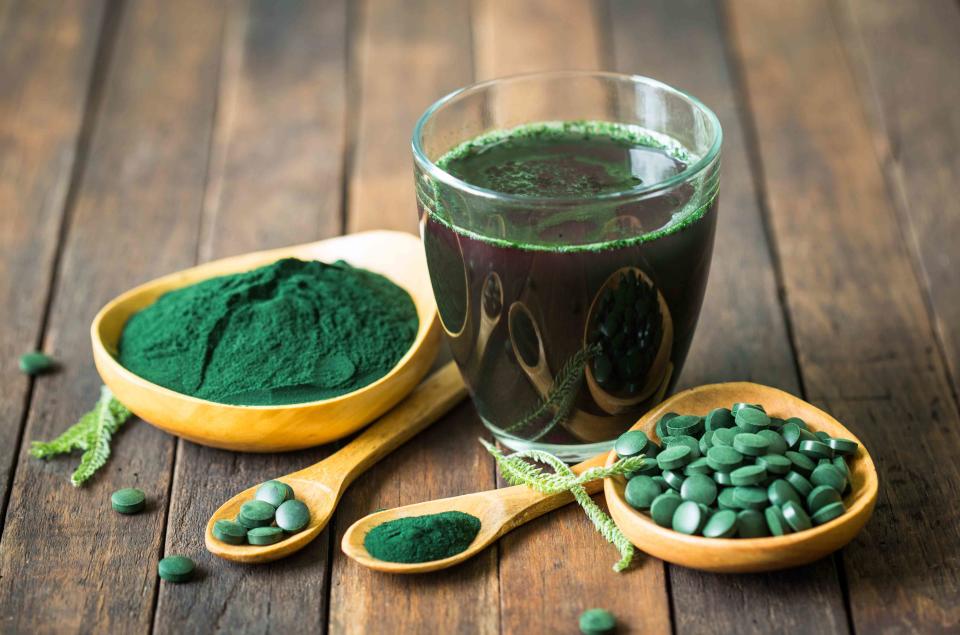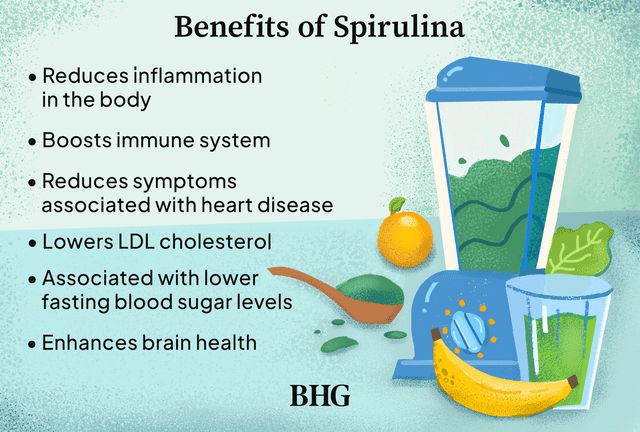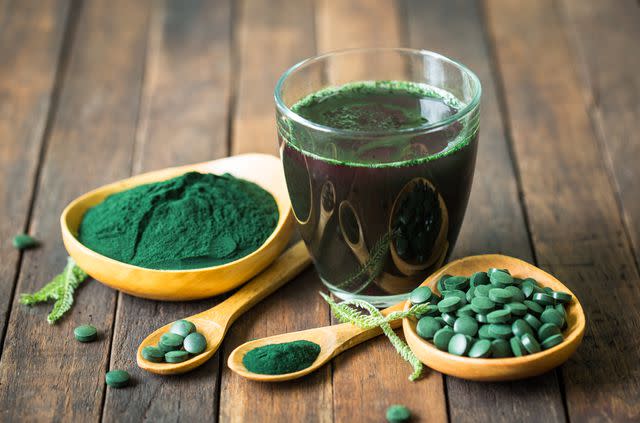Why You Should Be Adding Spirulina to Your Smoothies (and So Much More)
This sustainable algae will give you a nutritional boost.

pilipphoto / Getty Images
Spirulina, a type of blue-green algae, has been difficult to find on shelves in the past—but now it's available in most grocery stores and supermarkets. The allure of this popular aquatic plant comes from its health benefits, flavor profile, and sustainability potential—here's a full guide to what's inside the nutrient-dense supplement.
Related: Why You Should Be Eating More Sea Moss

BHG / Sydney Saporito
Spirulina’s Nutritional Profile
Found in brilliant green and blue varieties, spirulina is absolutely packed with vitamins, minerals, macronutrients, and plant compounds. This impressive nutrition profile is a key aspect to what sets spirulina apart as a bonafide superfood.
Protein
You might be surprised to find out that this ingredient is actually chock-full of protein, with a massive 16 grams per quarter cup. Protein is vital for healthy bones, muscles, skin, hair, nails, and basically every other type of tissue in the body. It’s also important for maintaining healthy blood cell function, and creates the enzymes needed to carry out vital chemical reactions in the body and contributes to improved digestion, immunity, and brain health.

pilipphoto / Getty Images
Omega-3 Fatty Acids
While vegan sources of omega-3 fatty acids can be hard to find, spirulina delivers. With a healthy helping of omega-3 and omega-6, spirulina can help you reap all the anti-inflammatory benefits of these fatty acids.
B Vitamins
Spirulina also provides a healthy dose of various B vitamins, especially thiamin, riboflavin, and niacin. These vitamins are key in maintaining healthy metabolism.
Iron
A single tablespoon of spirulina can provide over 10% of your daily iron needs. This mineral is vital for healthy growth and development, as well as hemoglobin formation—the protein in red blood cells charged with transporting oxygen from your lungs to every corner of your body.
Copper
Copper is also readily found in spirulina. This often overlooked mineral is a key player in immune system and nerve cell health, while also pivotal in iron absorption.
Manganese
Another mineral that you may not be too familiar with, manganese is also incredibly prevalent in spirulina. Manganese is super important for healthy tissue, hormone, bone, and blood formation while also playing a large role in various metabolic functions.
Pigment and Plant Compounds
One way spirulina really stands out in the health department is with its high concentration of pigment and plant compounds, including chlorophyll, carotenoids, phycocyanins, lutein, and zeaxanthin. While you may not be familiar with all of these names, the biggest takeaway is that all of these compounds are potent antioxidant and anti-inflammatory agents, helping you to fight off illness and chronic disease.
Related: 8 Anti-Inflammatory Foods to Add to Your Diet
Benefits of Spirulina
As you might imagine based on its nutritional profile, this amazing plant has been linked to quite a few impressive health benefits.
Immune Health
When it comes to immune health, spirulina delivers on all fronts. Due to the nutrients it contains, spirulina helps to reduce inflammation in the body, enabling the immune system to work more effectively. Its antioxidant capacity, too, helps to eradicate free radicals in the body, which are the culprits of a variety of health concerns—from minor inconveniences like wrinkles all the way to serious illnesses like cancer.
Cardiovascular Health
Spirulina has proven to be effective in reducing symptoms and conditions associated with heart disease as well. One analysis found it to be associated with lower overall cholesterol and triglyceride levels. Plus, the discussed spirulina's ability to reduce the harmful kind of cholesterol in the body, while increasing the beneficial kind. Another meta-analysis found that spirulina may also be associated with preventing and treating high blood pressure, though more evidence is needed to prove a definitive correlation.
Sustainability
If you're conscious of your food's environmental impact, spirulina is going to be an even more enticing addition to your nutrition regimen. There’s quite a few reasons spirulina is such a sustainability powerhouse, with potential to help lower the carbon footprint of the food system. Spirulina grows incredibly fast, and can be harvested in just two to three weeks. It can even be grown out of the ocean using hydroponic techniques, with minimal freshwater needs.
Adding Spirulina into Your Daily Routine
You may already be running out the door to pick some of this superfood up at your local grocery store or order it at your favorite smoothie spot, but before you grab your keys, there are a few more things to note.
If spirulina is grown in an unregulated environment, it can absorb environmental toxins that will then be passed on to you, so make sure to choose a brand that is third-party tested for purity standards. Spirulina can also reduce blood clotting, so if you have any clotting disorders, discuss adding spirulina to your diet with your healthcare provider. It also contains phenylalanine, an amino acid that causes harm to those with phenylketonuria (PKU). Generally, if you are in a high risk health group including those who are pregnant or breastfeeding, or if you're otherwise immunocompromised, it’s a good idea to run your interest in trying spirulina by your healthcare provider first.
While there is no official spirulina intake recommendation, the generally accepted dose is somewhere between one and three grams, up to 10 grams per day. With all the amazing health benefits and nutrient density spirulina has to offer, try adding a scoop to your next smoothie as an incredible addition to your healthy lifestyle.
For more Better Homes & Gardens news, make sure to sign up for our newsletter!
Read the original article on Better Homes & Gardens.

